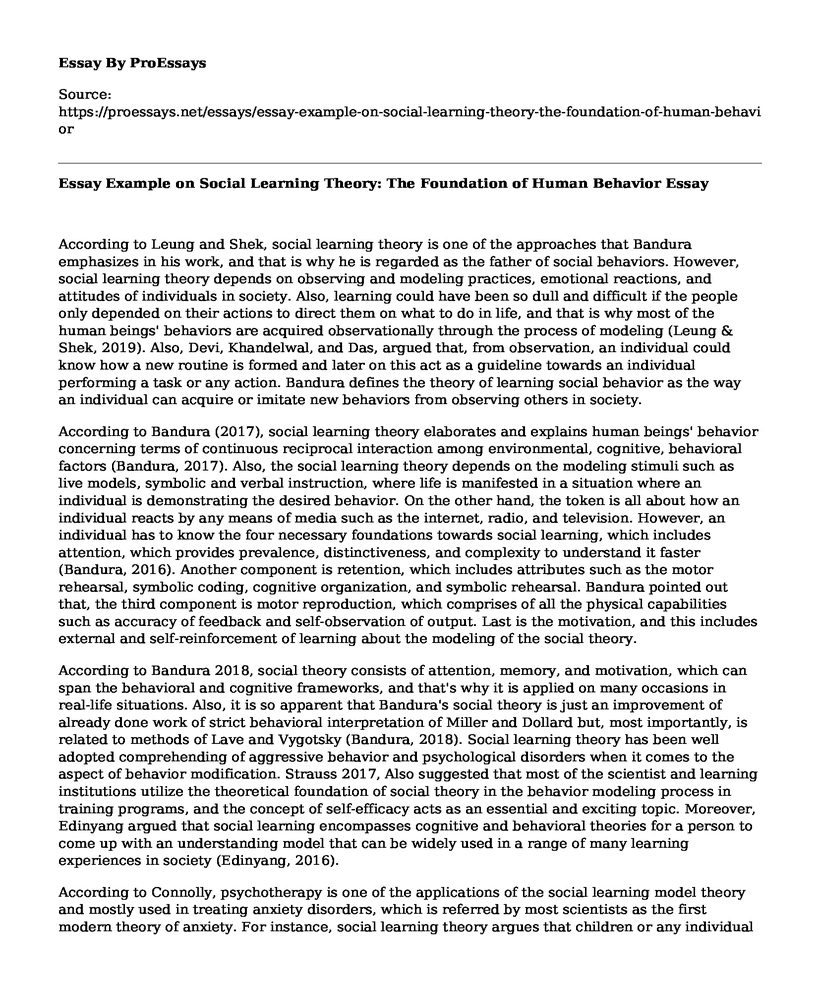According to Leung and Shek, social learning theory is one of the approaches that Bandura emphasizes in his work, and that is why he is regarded as the father of social behaviors. However, social learning theory depends on observing and modeling practices, emotional reactions, and attitudes of individuals in society. Also, learning could have been so dull and difficult if the people only depended on their actions to direct them on what to do in life, and that is why most of the human beings' behaviors are acquired observationally through the process of modeling (Leung & Shek, 2019). Also, Devi, Khandelwal, and Das, argued that, from observation, an individual could know how a new routine is formed and later on this act as a guideline towards an individual performing a task or any action. Bandura defines the theory of learning social behavior as the way an individual can acquire or imitate new behaviors from observing others in society.
According to Bandura (2017), social learning theory elaborates and explains human beings' behavior concerning terms of continuous reciprocal interaction among environmental, cognitive, behavioral factors (Bandura, 2017). Also, the social learning theory depends on the modeling stimuli such as live models, symbolic and verbal instruction, where life is manifested in a situation where an individual is demonstrating the desired behavior. On the other hand, the token is all about how an individual reacts by any means of media such as the internet, radio, and television. However, an individual has to know the four necessary foundations towards social learning, which includes attention, which provides prevalence, distinctiveness, and complexity to understand it faster (Bandura, 2016). Another component is retention, which includes attributes such as the motor rehearsal, symbolic coding, cognitive organization, and symbolic rehearsal. Bandura pointed out that, the third component is motor reproduction, which comprises of all the physical capabilities such as accuracy of feedback and self-observation of output. Last is the motivation, and this includes external and self-reinforcement of learning about the modeling of the social theory.
According to Bandura 2018, social theory consists of attention, memory, and motivation, which can span the behavioral and cognitive frameworks, and that's why it is applied on many occasions in real-life situations. Also, it is so apparent that Bandura's social theory is just an improvement of already done work of strict behavioral interpretation of Miller and Dollard but, most importantly, is related to methods of Lave and Vygotsky (Bandura, 2018). Social learning theory has been well adopted comprehending of aggressive behavior and psychological disorders when it comes to the aspect of behavior modification. Strauss 2017, Also suggested that most of the scientist and learning institutions utilize the theoretical foundation of social theory in the behavior modeling process in training programs, and the concept of self-efficacy acts as an essential and exciting topic. Moreover, Edinyang argued that social learning encompasses cognitive and behavioral theories for a person to come up with an understanding model that can be widely used in a range of many learning experiences in society (Edinyang, 2016).
According to Connolly, psychotherapy is one of the applications of the social learning model theory and mostly used in treating anxiety disorders, which is referred by most scientists as the first modern theory of anxiety. For instance, social learning theory argues that children or any individual might develop the fear of either wild animal or snake by observing one of the close family members display the fear in response to seeing that wild animal or snake (Connolly, 2017). Therefore, it is well known that through the knowledge of social learning, a therapist or counselor might be able on how to deal with anxiety disorders from a comprehensive perspective.
References
Bandura, A. (2016). 50 the power of observational learning through social modeling. Scientists making a difference: One hundred eminent behavioral and brain scientists talk about their most important contributions, 235.
Bandura, A. (2018). Toward a psychology of human agency: Pathways and reflections. Perspectives on Psychological Science, 13(2), 130-136.
Bandura, A. (Ed.). (2017). Psychological modeling: Conflicting theories. Transaction Publishers.
Bandura, A., & Hall, P. (2018). Albert bandura and social learning theory. Learning Theories For Early Years Practice, 63.
Connolly, G. J. (2017). Applying social cognitive theory in coaching athletes: The power of positive role models. Strategies, 30(3), 23-29.
Devi, B., Khandelwal, B., & Das, M. (2017). Application of Bandura's social cognitive theory in the technology enhanced, blended learning environment. International Journal of Applied Research, 3(1), 721-724.
Edinyang, S. D. (2016). The significance of social learning theories in the teaching of social studies education. International Journal of Sociology and Anthropology Research, 2(1), 40-45.
Johnson, P., Sakamoto, W., & Director, S. S. (2017). Social Learning Theory. Retrieved, 25, 1-2.
Leung, H., & Shek, Y. E. (2019). Behavioral, Cognitive-Behavioral, and Social Learning Approaches. The Encyclopedia of Child and Adolescent Development, 1-12.
Strauss, A. L. (2017). Psychological modeling: Conflicting theories. Routledge.
Cite this page
Essay Example on Social Learning Theory: The Foundation of Human Behavior. (2023, May 03). Retrieved from https://proessays.net/essays/essay-example-on-social-learning-theory-the-foundation-of-human-behavior
If you are the original author of this essay and no longer wish to have it published on the ProEssays website, please click below to request its removal:
- Paper Example on Communicative Organizational Model
- Summary of the Teaching Plan Paper Example
- Translation Explanatory Synthesis Essay
- Critical Reading of John Gatto's Article "Against School"
- Media Exposure and Violent Crimes - Essay Sample
- Essay on Enhance Your Appearance With Makeup: Different Reasons for Different Women
- Essay Example on Divorce: Adverse Effects on Children







